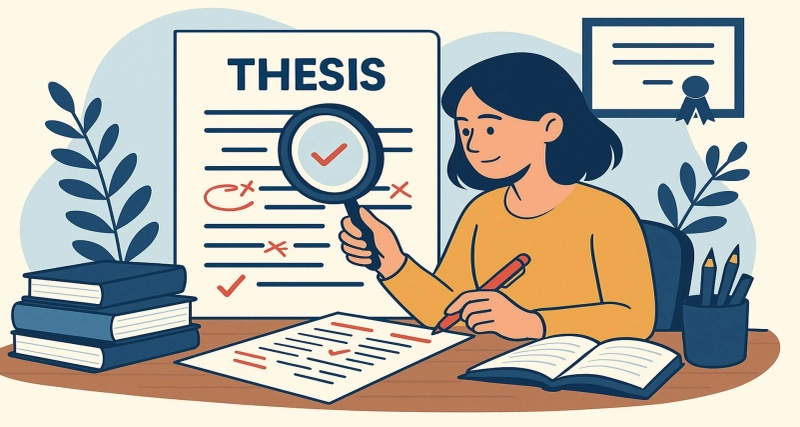1. Why Polishing Your Thesis Actually Matters
Okay, you’ve done the hard part you researched, wrote chapters, probably rewrote them five times, and stared at your screen till your eyes went fuzzy. But here’s the truth bomb: even the best research can flop if it’s full of typos, clunky sentences, or formatting that screams “I gave up halfway.”
Editing and proofreading are not just about fixing mistakes. They’re the final touches that make your thesis look and sound professional. In this blog, let’s break down what editing and proofreading really mean, where students usually mess up, and how a little expert help can take your thesis from “meh” to “masterpiece.”
2. Editing vs. Proofreading – What’s the Real Difference?
Let’s clear this up once and for all:
- Editing is like rearranging your furniture for the best vibe. It improves sentence flow, clarity, tone, and structure. It makes your thesis readable, logical, and easy to follow.
- Proofreading is more like cleaning up before guests arrive grammar checks, punctuation fixes, spelling slip-ups, and formatting issues.
You need both. Editing shapes the content. Proofreading polishes it.
3. What Do Professional Thesis Editors Actually Do?
Spoiler: they do a lot. Here’s a quick peek at what’s usually included (and yes, it’s more than just spell-check).
- Grammar, Spelling, and Punctuation Fixes
Removes language errors that hurt your credibility.
- Stylistic and Structural Edits
Smooth transitions, improves academic tone, and makes sure your paragraphs don’t sound like they belong in different books.
- Formatting According to Style Guides
Whether your unit wants APA, MLA, Chicago, or a template from the dark ages, editors will format it exactly as required.
- Citation and Reference Checks
Your in-text citations and reference list get a full audit so everything’s accurate and consistent.
- Clarity and Flow Fixes
Because nothing’s worse than brilliant research buried under confusing or repetitive sentences.
4. Common Thesis Issues That Editing & Proofreading Can Solve
You’re not alone if these sound familiar:
- Passive voice overload or vague wording – Editors help you sound more direct and confident.
- Choppy or inconsistent structure – Chapters should flow, not feel like they were written in different time zones.
- Repetitions, awkward phrasing, or unclear arguments – These get reworked for clarity and conciseness.
- Citation mess-ups or missing references – Big no-no for academic credibility.
- Grammar and spelling errors your brain just doesn’t see anymore – Editors catch what your tired eyes can’t.
5. Why Do Students Get Professional Help for This?
Because after writing 80+ pages, you can’t see the forest for the trees. You know what you meant, but that doesn’t mean it’s clear on paper.
Professional editors:
- Spot what you’ve become blind to
- Fix what you don’t even know is broken
- Save you from last-minute panic and surprise rejections
And if English isn’t your first language? This support can make all the difference.
6. How Expert Editing Improves Your Submission Game
Here’s what you really get when you go pro:
- Way fewer revisions from your guide or reviewers
- Meets every formatting, language, and citation requirement
- Looks polished, sharp, and submission-ready
- Peace of mind (seriously underrated during final semester chaos)
7. How to Choose the Right Thesis Editing and Proofreading Service
All editing services are not built the same. So here’s your little checklist:
- Look for editors with actual academic backgrounds (not just freelancers with Grammarly Pro)
- Make sure they know your subject area
- Ask about pricing, timelines, and revisions upfront
- Confirm they’re confidential and follow plagiarism ethics
- Ask for a sample or check their reviews don’t skip this step!
8. Final Thoughts – Don’t Submit Without a Final Polish
Your thesis deserves more than a rough draft vibe. You’ve worked way too hard to have small errors drag it down. Editing and proofreading aren’t extras; they're the final step that turns your research into something you can confidently submit (and be proud of later).
Investing in professional help isn’t cheating. It’s smart. It’s professional. It’s what scholars do.


